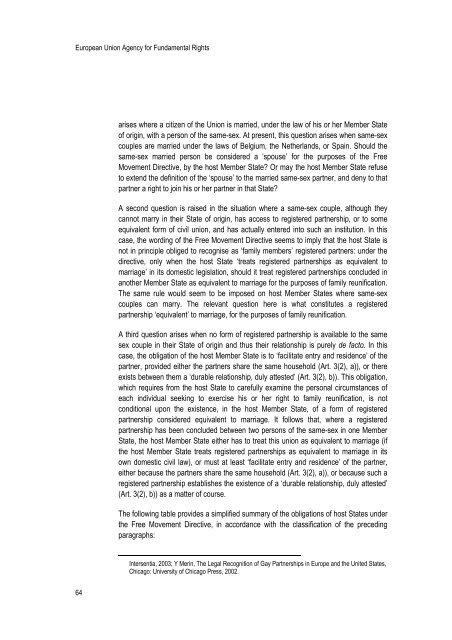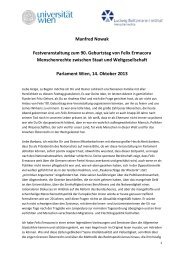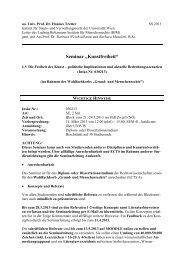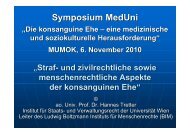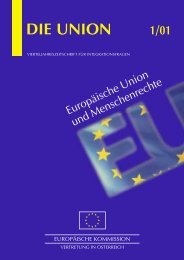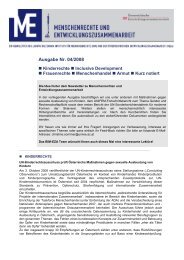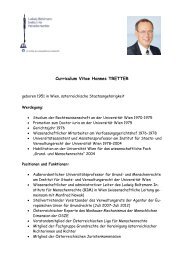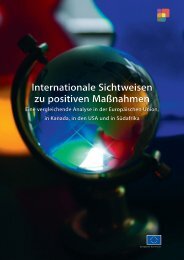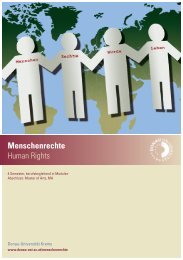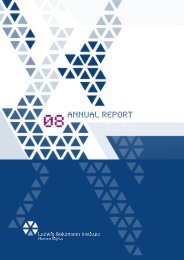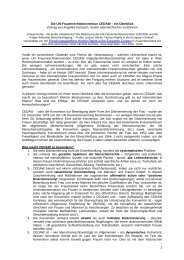Homophobia and Discrimination on Grounds of Sexual Orientation ...
Homophobia and Discrimination on Grounds of Sexual Orientation ...
Homophobia and Discrimination on Grounds of Sexual Orientation ...
You also want an ePaper? Increase the reach of your titles
YUMPU automatically turns print PDFs into web optimized ePapers that Google loves.
European Uni<strong>on</strong> Agency for Fundamental Rightsarises where a citizen <strong>of</strong> the Uni<strong>on</strong> is married, under the law <strong>of</strong> his or her Member State<strong>of</strong> origin, with a pers<strong>on</strong> <strong>of</strong> the same-sex. At present, this questi<strong>on</strong> arises when same-sexcouples are married under the laws <strong>of</strong> Belgium, the Netherl<str<strong>on</strong>g>and</str<strong>on</strong>g>s, or Spain. Should thesame-sex married pers<strong>on</strong> be c<strong>on</strong>sidered a ‘spouse’ for the purposes <strong>of</strong> the FreeMovement Directive, by the host Member State? Or may the host Member State refuseto extend the definiti<strong>on</strong> <strong>of</strong> the ‘spouse’ to the married same-sex partner, <str<strong>on</strong>g>and</str<strong>on</strong>g> deny to thatpartner a right to join his or her partner in that State?A sec<strong>on</strong>d questi<strong>on</strong> is raised in the situati<strong>on</strong> where a same-sex couple, although theycannot marry in their State <strong>of</strong> origin, has access to registered partnership, or to someequivalent form <strong>of</strong> civil uni<strong>on</strong>, <str<strong>on</strong>g>and</str<strong>on</strong>g> has actually entered into such an instituti<strong>on</strong>. In thiscase, the wording <strong>of</strong> the Free Movement Directive seems to imply that the host State isnot in principle obliged to recognise as ‘family members’ registered partners: under thedirective, <strong>on</strong>ly when the host State ‘treats registered partnerships as equivalent tomarriage’ in its domestic legislati<strong>on</strong>, should it treat registered partnerships c<strong>on</strong>cluded inanother Member State as equivalent to marriage for the purposes <strong>of</strong> family reunificati<strong>on</strong>.The same rule would seem to be imposed <strong>on</strong> host Member States where same-sexcouples can marry. The relevant questi<strong>on</strong> here is what c<strong>on</strong>stitutes a registeredpartnership ‘equivalent’ to marriage, for the purposes <strong>of</strong> family reunificati<strong>on</strong>.A third questi<strong>on</strong> arises when no form <strong>of</strong> registered partnership is available to the samesex couple in their State <strong>of</strong> origin <str<strong>on</strong>g>and</str<strong>on</strong>g> thus their relati<strong>on</strong>ship is purely de facto. In thiscase, the obligati<strong>on</strong> <strong>of</strong> the host Member State is to ‘facilitate entry <str<strong>on</strong>g>and</str<strong>on</strong>g> residence’ <strong>of</strong> thepartner, provided either the partners share the same household (Art. 3(2), a)), or thereexists between them a ‘durable relati<strong>on</strong>ship, duly attested’ (Art. 3(2), b)). This obligati<strong>on</strong>,which requires from the host State to carefully examine the pers<strong>on</strong>al circumstances <strong>of</strong>each individual seeking to exercise his or her right to family reunificati<strong>on</strong>, is notc<strong>on</strong>diti<strong>on</strong>al up<strong>on</strong> the existence, in the host Member State, <strong>of</strong> a form <strong>of</strong> registeredpartnership c<strong>on</strong>sidered equivalent to marriage. It follows that, where a registeredpartnership has been c<strong>on</strong>cluded between two pers<strong>on</strong>s <strong>of</strong> the same-sex in <strong>on</strong>e MemberState, the host Member State either has to treat this uni<strong>on</strong> as equivalent to marriage (ifthe host Member State treats registered partnerships as equivalent to marriage in itsown domestic civil law), or must at least ‘facilitate entry <str<strong>on</strong>g>and</str<strong>on</strong>g> residence’ <strong>of</strong> the partner,either because the partners share the same household (Art. 3(2), a)), or because such aregistered partnership establishes the existence <strong>of</strong> a ‘durable relati<strong>on</strong>ship, duly attested’(Art. 3(2), b)) as a matter <strong>of</strong> course.The following table provides a simplified summary <strong>of</strong> the obligati<strong>on</strong>s <strong>of</strong> host States underthe Free Movement Directive, in accordance with the classificati<strong>on</strong> <strong>of</strong> the precedingparagraphs:Intersentia, 2003; Y Merin, The Legal Recogniti<strong>on</strong> <strong>of</strong> Gay Partnerships in Europe <str<strong>on</strong>g>and</str<strong>on</strong>g> the United States,Chicago: University <strong>of</strong> Chicago Press, 2002.64


